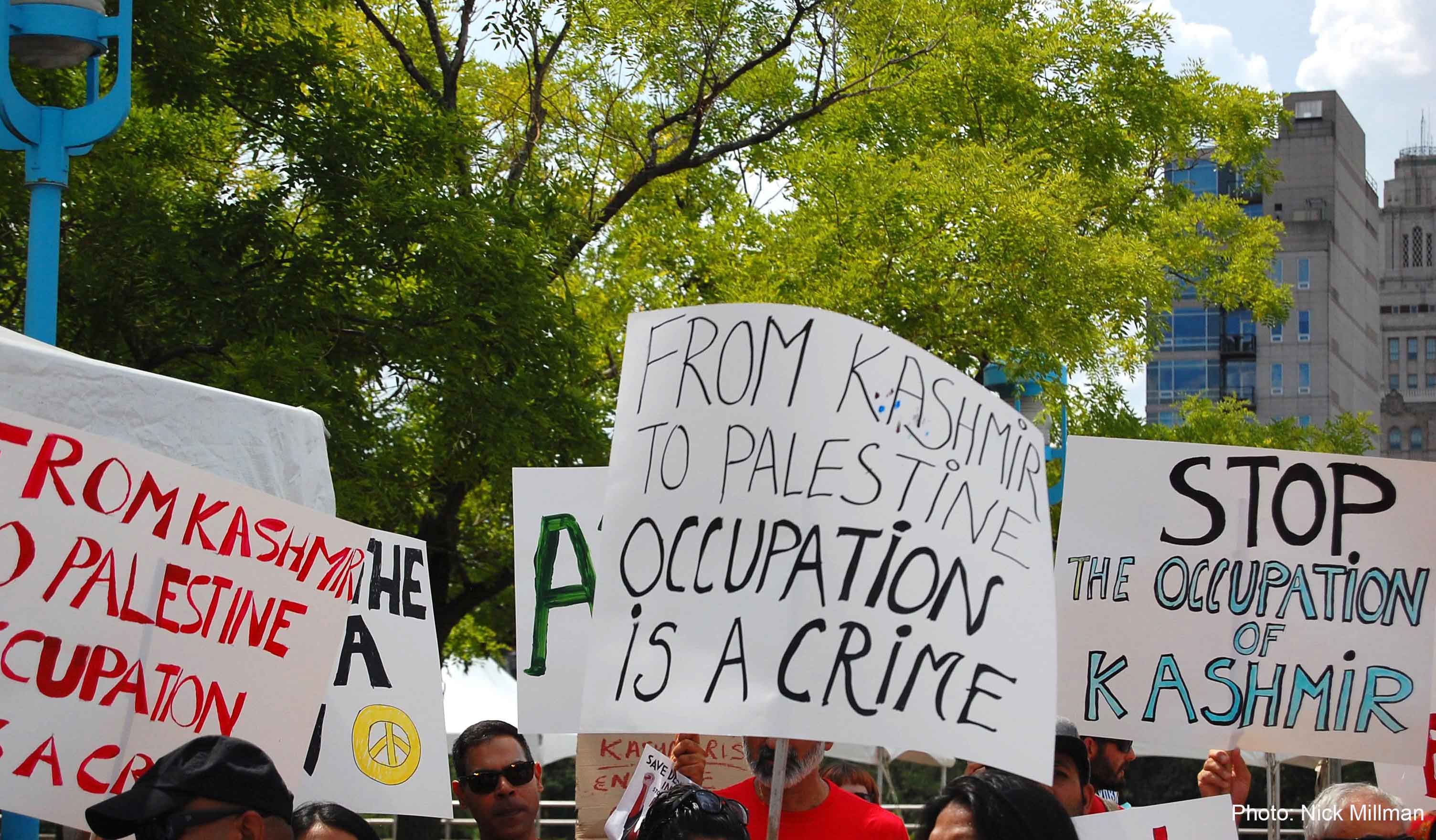
by Muhammad Wasama Khalid 1 November 2023
The conflicts in Palestine and Indian-administered Jammu and Kashmir (IIOJK) are among the world’s most protracted and complex disputes, deeply entrenched in both territorial and ideological dimensions.
While the regions are geographically distant, their shared struggles are marked by striking parallels, making it imperative to draw attention to the moral and humanitarian similarities between these two long-standing conflicts.
In 1947-48, the United Nations made promises to the peoples of Palestine and Kashmir, granting them the right to self-determination. However, these promises remain unfulfilled to this day. The failure of the international community, particularly the UN, to enforce its own decisions regarding these two regions has had profound consequences.
The failure to address the issues of self-determination in Palestine and Kashmir has led to instability in the Middle East and South Asia, with conflicts erupting as a direct result.
The Middle East has witnessed at least six major military conflicts in the past 70 years, while in IIOJK, the unresolved issue has led to two major wars between India and Pakistan.
The consequences of the international community’s failure to resolve these issues are numerous and far-reaching. Both regions suffer from illegal military occupations, impunity for military forces, human rights violations with alarming genocidal tendencies, widespread mental and psychological suffering, collective punishment, and environmental degradation.
Given the oppressive conditions they face, it is no wonder that the Palestinians and Kashmiris resist these illegal occupations.
According to international law, they have every right to oppose foreign oppressors who violate their human rights, alter their demographic structures, and threaten peace and security in the regions.
In both cases, the occupying forces consistently violate human rights, often engage in demographic manipulation, and pose significant threats to regional peace and security.
The recent legislation introduced by India to allow Indian citizens to permanently reside and buy land in IIOJK bears a resemblance to the unjust laws implemented by Israel in Palestine for decades.
India’s close partnership with Israel in the realms of arms exports and military training is disconcerting. India has become one of Israel’s largest arms export clients, with a significant portion of these arms deployed in IIOJK.
Indian police forces receive training in Israel for so-called “anti-terror” operations, echoing Israel’s approach to dealing with Palestinians.
For the oppressed Palestinians and Kashmiris, the struggle for freedom is not merely a political battle; it is a question of their moral, social, and political survival. The parallels between these two simmering conflicts are striking.
In Kashmir, a population has endured decades of Indian atrocities while yearning for the right of self-determination. In Palestine, a people have resisted brutal Israeli occupation, striving for their own self-determination.
United Nations resolutions, such as 194 and 242 in the context of the Palestine-Israeli dispute and those of August 13, 1948, and January 5, 1949, in the context of the Kashmir dispute, have consistently advocated for the right of self-determination for Palestinians and Kashmiris.
Tragically, these resolutions have remained largely unimplemented, leaving both regions in a state of prolonged turmoil.
The plight of Palestinians residing in the Occupied Palestinian Territories (OPT) closely mirrors the suffering of Kashmiris in IIOJK. Both communities have been victims of enduring Israeli and Indian atrocities, and despite diplomatic overtures for peace, there is a glaring dearth of substantive progress.
The focus in both cases is on the common denominator: the oppressed populations are predominantly Muslim, while the oppressors hail from non-Muslim communities.
One must consider the historical underpinnings of these conflicts, rooted in the British colonial project, which was engineered to secure future geopolitical interests.
Israel and India, as occupying states, appear to be serving an agenda that targets Muslims in the Middle East and the Indian Subcontinent, respectively. In the case of IIOJK, the people of Jammu & Kashmir have been subjected to gross human rights violations and abuses committed by Indian security forces.
Over the years, these violations have included torture, rape, and extrajudicial executions, leading to the deaths of over 100,000 Kashmiris, with hundreds of thousands remaining detained or missing.
Moreover, Netanyahu’s illegal and expansionist agenda in the West Bank, coupled with Modi’s controversial move of revoking Article 370 in 2019, underscores their collaborative stance.
The parallels between the Israeli-Palestinian conflict and the situation in Kashmir are deeply concerning. The idea of annexation and the application of Israeli-style solutions in Kashmir have been discussed by Indian political and state representatives. This underscores the urgency of addressing the moral and humanitarian similarities between IIOJK and Occupied Palestine.
The similarities between the conflicts in IIOJK and Occupied Palestine are not merely coincidental but rooted in shared experiences of prolonged struggle for self-determination and the consequences of international inaction.
Recognizing these parallels is not only a matter of moral and humanitarian concern but also a call to action for the international community to prioritize peace, justice, and the rights of all peoples, regardless of their geographical location. The time for meaningful change and a just resolution to these conflicts is long overdue.
